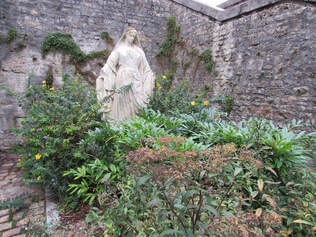 There are two cellars at the Great House in the Ukraine: one reached by an inside door in the big kitchen, while the other is outside, close to the house. They are both large, keeping cool the many jarred fruits and vegetables of the farm, bottles of homemade wine, and other stored foods. Nonna’s father digs a connecting tunnel between the two, hiding each end behind cupboards, producing a space in which his family can hide from the surging force. He wants to peaceably surrender after the violence of the advancing front has passed by. Speaking fluent German, he expects to be listened to. In the fall of 1941, as the Russians are fleeing before the German onslaught, the few people choosing to remain are destitute. There is no electricity, no men to chop firewood in the forest, and few sources of food. As the temperatures drop, the invading soldiers ransack farms, villas, villages, and towns for shelter, winter clothing, and anything to eat and drink. Nonna, who is fourteen, and Anna, her mother, who is thirty-eight, move from the Great House into an abandoned home in the nearby village, finding it easier to barter crafts, trade family possessions, and swap trinkets for food and supplies. Her father stays behind, hidden in his bunker between the cellars. However, he catches a cold while working in the damp underground, and when he cannot contain his coughing, drunken German soldiers enjoying the cellar’s wine discover his hiding place. They beat him unmercifully, and gouge out his eyes. A neighbor helps the grandmother bring him to Nonna’s house in town. He lingers in great pain and then mercifully dies. The grandmother returns to the Great House, leaving Nonna and Anna on their own. Remember the stories of the Russian winter of 1941-42? How brutally cold it was and how inadequately prepared the German army was? That it was the reason for their defeat? It’s the same winter that Nonna and her mother now experience. They are much farther south, but she tells of having a constant three feet of snow with temperatures of 47 degrees below zero. Cows fall dead in their pens, horses freeze to death while pulling sleighs, birds drop from the sky; hardly a living thing survives out in the open. Thirty percent of German artillery is still being pulled by teams of horses and they die by the hundreds. Tank and truck engines cannot be turned off because the oil would freeze, wasting even more of their limited fuel supplies. Remember the startling scene in Dr. Zhivago of the ornate country house covered in ice? Nonna and Anna live in a house with a thick layer of ice on the inside of the walls. They tear apart furniture to burn in the kitchen stove and sleep under the mattress at night for more insulation. There is no water except for what they can melt. But they endure. In the Spring, they move back to the Great House to be with the grandmother, but then return to town in the summer to be closer to the church, which meets secretly. They both sing to keep their hearts alive. Even as they are withdrawing from Russia territory, the Germans seek out Ukrainian and Russian workers, promising food and shelter in exchange for working in Poland and Germany. The Russian army, now on the offense, has been ordered to consider those who did not flee the Germans the year before to be traitors. They are to be executed or sent to Siberia. Nonna and Anna feel that they have no choice but to volunteer for the German work camps. In the fall of 1942, Nonna and her mother are crammed into cattle cars and taken across the country by various trains. The first work camp provides workers to a carton factory in Kassel, Germany. Six months later, they work in a textile factory in Lichtenau, then in a porcelain factory in Buchenwald. The work camps are little better than concentration camps, with barracks segregated by sex and nationality, with three-tier mattressless bunks that hold as many as can be squeezed into them. There is little heat, a single blanket for each person, with cabbage soup and a three-by-three-inch piece of bread provided daily to eat, but there are fewer brutalities because the workers are needed. The two of them are returned to Kassel, where they are selected to work in a Catholic hospital at Marienkrankenhaus. By this time, Anna has been recognized for her musical abilities and her handywork: she serves the Kommandant by playing the piano and singing, and also paints portraits of his family. Nonna uses her father-taught skills to serve as an interpreter: she speaks fluent Russian, Ukrainian, Polish, Yiddish, and German. At the hospital, built for treating prisoners-of-war and work camp prisoners, she is in constant demand in the admittance office to help with communications between patients and nurses. It is a good life compared to what they had. They are soon favorites of the hospital staff and are treated as family members by the priests and nuns. On September 22, 1944, Anna is told to report to the local Gestapo authorities; no reason is given. She does not come back and Nonna never sees her again. She will hear later that Anna was taken to a concentration camp called Ravensbruck, then was moved to a camp at Flossenberg. It is known as being one of the worst. By the end of the war, 73,000 prisoners will have died there of malnutrition, lack of medical care, and brutality. Four months after the war in Europe ends, Nonna receives a letter written in Polish and Yiddish. The unidentified author tells that her mother had routinely played the piano at receptions held by the Flossenberg camp Kommandant. Weak and malnourished, she injures her arm and refuses to play. The Kommandant has both her arms and all of her fingers broken in retaliation. Anna does not recover from her injuries and becomes delirious. Considering her as good as dead, the Kommandant orders her thrown into the incinerator. Anna dies only days before she would have been set free. The Second U. S. Cavalry liberates the Flossenberg camp on April 23, 1945. Life without her mother is more difficult for Nonna and she suffers from rheumatic fever and angina. She becomes a patient in the hospital. The priests and nuns declare to the authorities that she is Catholic and draft her into the cloister to protect her from being taken away. She is, at one point, given last rites, but she defies them all, and survives. In the two-year period of 1945-1947, she is cared for, slowly recovers, and gradually returns to work. Through it all, she keeps writing in her diary. Nonna eventually qualifies to be a nurse and asks to be transferred to a new Allied hospital in Merxhausen. It treats refugees from the concentration camps and Nonna hopes that the letter was wrong and that her mother survived. She attends a nursing school in Bad Hersfeld, graduating with honors in only a few months, then finishes the coursework at a pre-med school in Heidelberg. But she wants a new life. She wants out of Germany and she wants out of Europe. She wants to go to America. Nonna accepts the position of personal secretary to the woman in charge of the International Refugee Organization in Germany. Mrs. Hawksley helps her do the paperwork for a visa, but it takes two years to finally be granted. The German government wants her to stay and go to medical school, even threatening her if she were to leave. Germany does need doctors, but there’s also a covert desire not to let her go; she knows too much about what happened. Eventually, though, there is a ship steaming across the ocean, there is New Orleans, there is Henry, and then, fifty years later, there is her story. A story that everyone should hear and that no one should forget.
1 Comment
Donna Hill
3/20/2022 10:16:44 am
Thank you for posting more of this story
Reply
Leave a Reply. |
AuthorDon Willerton has been a reader all his life and yearns to write words like the authors he has read. He's working hard at it and invites others to share their experiences. |

 RSS Feed
RSS Feed